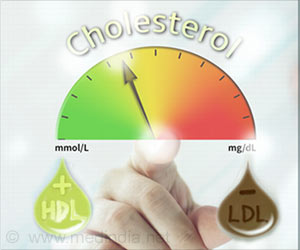New genes have been found that influences blood cholesterol levels. The study of 20,000 people across the world found seven new genes and 11 already known genes that control blood cholesterol levels.
New genes have been found that influences blood cholesterol levels. The study of 20,000 people across the world found seven new genes and 11 already known genes that control blood cholesterol levels. The international study led by researchers from the University of Michigan School of Public Health set out to identify or confirm genetic variants that influence lipid levels, and secondly, to see if those variants were linked to the decreased or increased risk of heart disease. The findings will be published online in the journal Nature Genetics on Jan. 13.
The results may lead the medical community to rethink the role of HDL (good cholesterol) and LDL (bad cholesterol) in heart disease, said Goncalo Abecasis, associate professor in the U-M School of Public Health. Abecasis co-directed the study with Karen Mohlke, assistant professor of genetics at the University of North Carolina at Chapel Hill School of Medicine."It was surprising that while genetic variants that increase your bad cholesterol are also associated with increased risk of heart disease, we did not find that variants influencing your good cholesterol were associated with decreased risk of coronary artery disease. Perhaps that result will lead us to reexamine the roles of good and bad cholesterol in susceptibility to heart disease," Abecasis said.
Coronary artery disease, a condition where plaque accumulates on the walls of coronary arteries, is the most common type of heart disease and a leading cause of death in industrialized countries. The type and amount of cholesterol and other lipids in the bloodstream contribute to the risk of coronary artery disease, which can cause heart attack, stroke, angina and other heart conditions. Both genetic and environmental factors influence a person's cholesterol and blood lipid levels.
"Finding new gene regions associated with cholesterol levels may bring us one step closer to developing better treatments, said Cristen Willer, co-first author and a research fellow in the Department of Biostatistics. "Nearly all of the gene regions that we found to be involved in higher LDL levels were also involved in coronary artery disease risk. This is a remarkable result and suggests that new drug therapies that target the genes in these regions will also help prevent coronary artery disease and allow people to live longer and healthier lives." Serena Sanna, who worked on the paper as a post-doctoral student in Abecasis' group and who is now at the National Research Council di Cagliari in Italy, is co-first author.
Of the seven new variants, two influenced HDL, one influenced LDL, and three influenced triglycerides, which are found in fat and in the bloodstream and like LDL, are associated with increased risk of heart disease. One variant influenced triglycerides and LDL.
Scientists initially examined 2 million genetic variants in 8,800 individuals and ended up focusing on a total of 25 genetic variants on 18 genes. Altogether the variations reported are responsible for less than a quarter of the genetic contributions to lipid levels.
Source-Eurekalert
LIN/M










